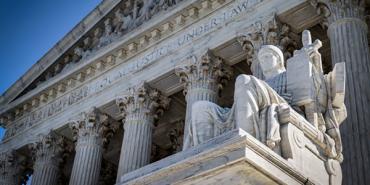The AFT and dozens of other education and religious groups are watching closely this week as the Supreme Court considers whether to strike down the prohibition on state funding for religious education. The case, Espinoza v. Montana Department of Revenue, examines whether school voucher programs—which use tax-credited donations to pay for scholarships to private schools—must include religious schools among those they fund.
If the court rules in favor of religious school vouchers, “it will be a virtual earthquake in terms of what will happen to religious liberty and public education in this country,” says AFT President Randi Weingarten. The AFT is among dozens of education, religious and civil rights organizations, and legal experts—along with 10 states—that have filed amicus briefs to protect the ban on religious school vouchers.
These public education advocates—including the many protesters expected outside the court on the day of opening arguments, Jan. 22—call the case a dangerous attempt to mandate taxpayer support for religious schools, where students may learn intolerance of other religions, be indoctrinated against sexual preferences and gender identities, and be encouraged to reject science in favor of creationism. “The question before the court is simple yet critical,” says Rachel Laser, president of Americans United for Separation of Church and State. “Does the court require that we pay for religious education and religious practice? … Does the Constitution require that our tax dollars go to support schools that would refuse to hire LGBTQ people or take their kids?” Or, she adds, does it require that Jewish and Muslim families pay for Christian indoctrination?
Religious institutions are also opposing the vouchers, which would entangle the government in their function and undermine freedom of religion.
The First Amendment is at the center of the argument: AFT leaders and others call it “inconceivable” that those who wrote it—the framers of the Constitution—intended to require public funding of religious institutions or schools. In fact, that’s exactly what the amendment’s free exercise clause and the concept of separation of church and state were intended to prevent: “Congress shall make no law respecting an establishment of religion or prohibiting the free exercise thereof,” it reads. This clause ensures Americans’ freedom to practice the religion of their choice by keeping the government out of those decisions, and it is the reason we became a nation of citizens who are deeply religious and who hold diverse faiths and views.
The Espinoza case is “a total and utter perversion of the First Amendment,” says Weingarten. “It turns the free exercise clause on its head to mandate particular support for religion.”
Espinoza’s impact will be felt far beyond Montana: Thirty-eight states include language in their state constitutions to prevent the funding of religious schools, indicating that public money should go to public education. All of them are threatened.
This case is also bigger than one parent suing the state of Montana. The plaintiff, Kendra Espinoza, is a mother who wants the state to pay for her children to attend religious school, but the case is actually funded by the Institute for Justice, which has collected tens of millions of dollars from the Waltons, the DeVoses, Charles Koch and other wealthy, right-wing donors. They are bankrolling this effort as a backdoor attempt to get the Supreme Court to impose the failed DeVos agenda of private school vouchers nationwide.
Join the AFT on Twitter and on Facebook to resist this effort to privatize education and allow the public funding of religious schools.
[Virginia Myers]

